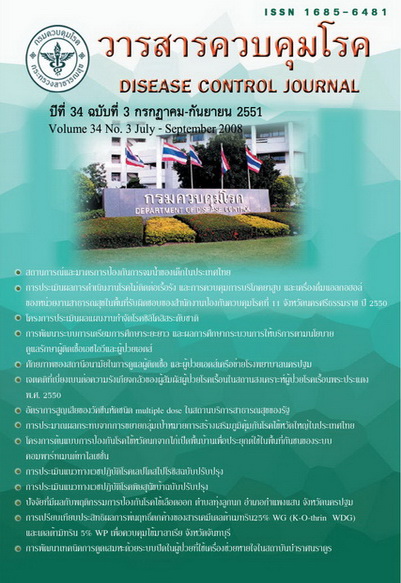Factors Affecting Prevention Behavior of Dengue Hemorrhagic Fever in Tumbol Thooglooknok Kampangsaeng District in Nakonpratom Province
Keywords:
Prevention behavior, Dengue Haemorrhagic FeverAbstract
The main objective was to study the behavior of population for the prevention of dengue hemorrhagic fever among Tumbol Thooglooknok Kampangsaeng District in Nakonpratom Province. The study design was cross - sectional studies, the sample included 180 persons. The study was conducted between November 2007 - January 2008. The questionnaires included information on the sociodemographics char acteristics such as gender, age, current marital status, occupation, educational level, income and information knowledge, attitude and practices about dengue hemorrhagic fever. Data were subsequently analysis with descriptive, presented by mean of frequency and standard deviation. The comparison characteristics of group was conducted with chi-square test, logistic regression analysis was performed to simultaneously control of confounders. The result of the study showed that the sample were female at 63.3%. Most of the respondent (79.4%) were married and 44.4% had primary education level, 42.8% had family history of dengue hemorrhagic fever. The mean current family income was 55,741Baht per year. Overall knowledge about dengue hemorrhagic fever prevention and control found were at moderate level (46.9%). The mean of knowledge about dengue hemorrhagic fever was 7.9. The most attitude of practice toward dengue hemorrhagic fever was73.4% and at moderate level was 26.6%, the mean of score 37.5. Overall the practice about dengue hemorrhagic fever prevention and control was found to be at moderate level (39.1%), the mean of total 70.3 and the standard deviation 15.3. We found that age, education level overall were significantly related to prevention and control of dengue hemorrhagic fever (p-value<0.05). From this study it was concluded the knowledge, attitudes toward dengue hemorrhagic fever and dengue hemorrhagic fever prevention were important, thus this study could be applied in community in high incidence area or could be applied to promote other health behavior.
Downloads
References
2. นาทีรัตน์ สังขวิทยา, สุนทรี โรจนสุพจน์, ดนัย ชาตยานนท์, Halstead SB.การวิจัยระบาดวิทยาของโรคไข้เลือดออกในประเทศไทย. วารสารกรมวิทยาศาสตร์การแพทย์, 2530.29(2):41-44.
3. กระทรวงสาธารณสุข, กรมควบคุมโรคติดต่อ. โรคไข้เลือดออกฉบับประเกียรกณก. กรุงเทพฯ :[ม.ป.ท.], 2544.
4. เมธี จันท์จารุกรณ์ และเพียงพร กันหารี. การศึกษารูปแบบการบริหารจัดการงานสาธารณสุขมูลฐาน ในองค์การบริหารส่วนตำบล (อบต.) ภาคกลาง. กรุงเทพฯ : เอดิสันเพรส โพรดักส์, 2541.
5. นนทรี ชมเชยเนติธรรม. ประสิทธิผลของโปรแกรมสุขศึกษาต่อพฤติกรรมการป้องกันและควบคุมโรคไข้เลือดออกของมารดา อำเภอเมือง จังหวัดนนทบุรี. วิทยานิพนธ์วิทยาศาสตร์ มหาบัณฑิต. บัณฑิตวิทยาลัย, มหาวิทยาลัยมหิดล,2546.
6. สำนักงานสาธารณสุข,จังหวัดนครปฐม, งานควบคุมโรค. รายงานทางระบาดวิทยา, 2551.
7. โรงพยาบาลกำแพงแสน, งานควบคุมโรค. รายงานทางระบาดวิทยา, 2549.
8. Bloom, B.S., et al. Taxonomy of education objectives handbook I: Cognitive domain. New York : David Mckay Company, Inc.1968.
9. จิตร สิทธิอมร. จิราพร เขียวอยู่และวินิส อุดมประเสริฐกุล.การเลือกใช้สถิติในการวิจัย หลักการวิจัยทางการแพทย์: คณะแพทยศาสตร์ จุฬาลงกรณ์มหาวิทยาลัย, กรุงเทพ:ศิริสาสน์การพิมพ์, 2548.
10. Selvin, S. Statistical Analysis of Epidemiologic Data. New York :Oxford University Press, 1991.
11. ดุสิต สุจินารัตน์. การวิเคราะห์ข้อมูลด้วย SPSS for window. คณะสาธารณสุขศาสตร์, มหาวิทยาลัยมหิดล:พิมพ์ครั้งที่ 3 กรุงเทพ:เจริญดีการพิมพ์, 2544.
12. รุ่งทิวา สุดศิริ .การพัฒนารูปแบบโรงเรียนส่งเสริมสุขภาพเพื่อป้องกันและควบคุมโรคไข้เลือดออกของนักเรียนชั้นประถมศึกษาตอนปลายจังหวัดนครนายก. วิทยานิพนธ์.บัณฑิตวิทยาลัย, มหาวิทยาลัย มหิดล, 2542.
13. สังวาล เจริญรบ และคณะ. สภาพการณ์ ความรู้ ทัศนคติและการปฏิบัติตนในการป้องกันและ
โรค ในจังหวัดร้อยเอ็ด. เอกสารอัดสำเนา. 2539
14. อัญชนา ประศาสน์วิทย์ และคณะ. การนำกระบวนการประเมินชุมชนแบบมีส่วนร่วมไปใช้ในการควบคุมแหล่งเพาะพันธุ์ยุงลายในจังหวัดนครราชสีมา. เอกสารอัดสำเนา.2541.
Downloads
Published
How to Cite
Issue
Section
License
Articles published in the Disease Control Journal are considered as academic work, research or analysis of the personal opinion of the authors, not the opinion of the Thailand Department of Disease Control or editorial team. The authors must be responsible for their articles.






